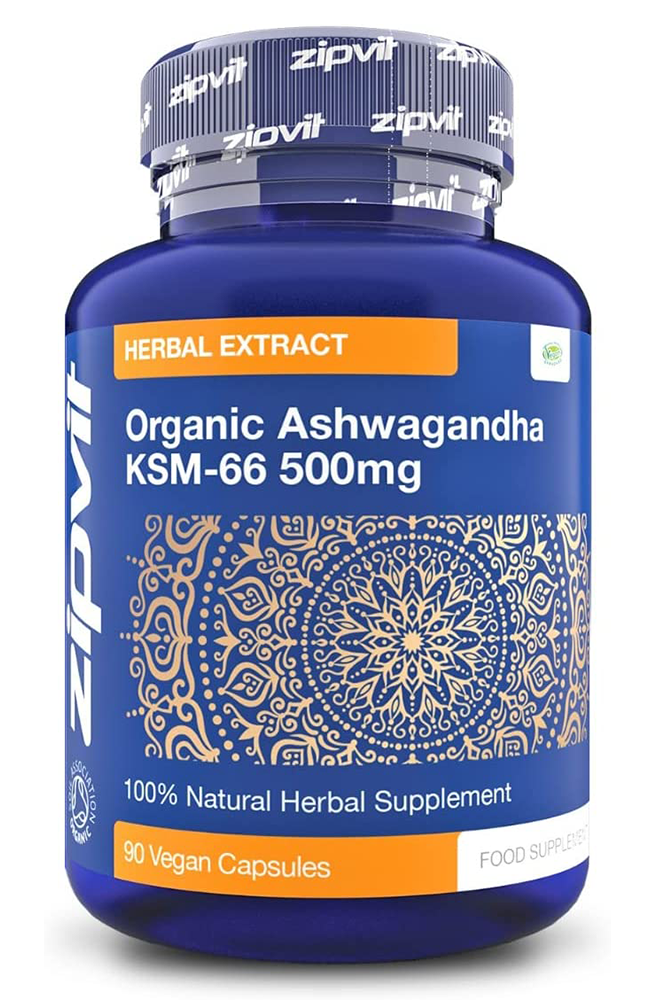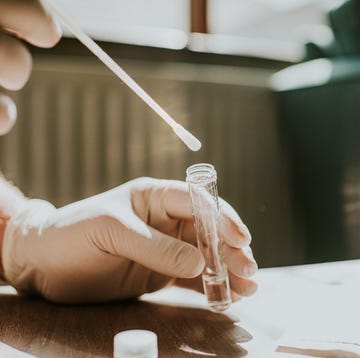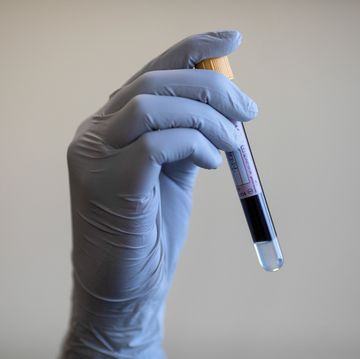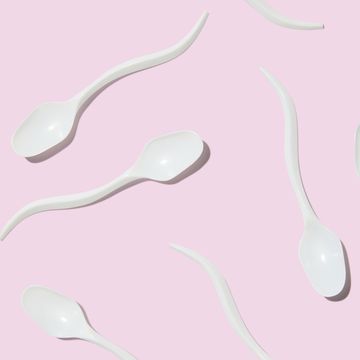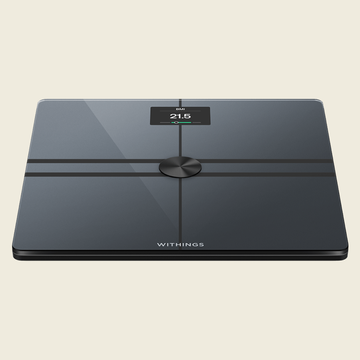Ashwagandha might be tricky to pronounce (it's ash-wa-gan-da, FYI) but this small, evergreen plant has become the health influencer’s supplement du jour. Touted as the ultimate remedy to 21st-century living, ashwagandha is what’s known as an ‘adaptogen’. “In other words, it’s a natural substance that helps the body to adapt to stress,” explains Mina Khan, a pharmacist with a background in Indian Ayurvedic medicine.
While it may be new to us Brits, ashwagandha is a powerful herb prominent in Ayurvedic medicine, one of the world’s oldest medical systems, and its history of use as a medicine dates back to AD 6000. The bioactive compounds in the plant exert ‘antioxidant, anti-inflammatory, and immunomodulatory activities that herbalists say can help reduce stress and anxiety, boost testosterone levels, and potentially alleviate the symptoms of certain diseases.
In a world filled with relentless calendar notifications, a natural stress-soothing solution definitely appeals. “The modern world brings with it lots of stress and long working hours for many,” says Khan, “ashwagandha is likely to be particularly of interest to people who want natural solutions to stress, and want to enhance their energy levels and benefit from increased mental clarity.”
What Is Root Ashwagandha?
Native to India, North Africa and the Middle East, ashwagandha’s botanical name is withania somnifera, though it’s sometimes referred to as Indian ginseng or winter cherry. If this all seems a bit too far removed from your local supermarket, ashwagandha is part of the nightshade family, which includes potatoes, tomatoes, bell peppers, and chilli peppers. While various parts of the plant are used, including the leaves, seeds, and even fruit, ashwagandha root is used most commonly.
“Ashwagandha adapts to the needs of the body, helping to support it and reduce negative changes during times of emotional and physical stress by strengthening the endocrine and nervous systems,” says Sebastian Pole, co-founder and master herbsmith at Pukka Herbs. This capacity to help the body adapt to stress “is reflected by its ability to thrive in very dry conditions in poor-quality soils,” he continues. “Most plants would suffer from severe stress in such an environment.”
Ashwagandha supposedly smells like horses – ashva means ‘horse’ and gandha means ‘smell’ in Sanskrit – and the name also refers to the horse-like strength the herb is purported to stimulate. Don’t let the horse connotations put you off, though. Here, we run through the science-backed benefits of ashwagandha, including the dosage and side effects.
Benefits of Ashwagandha
While there are a whole host of health benefits associated with taking ashwagandha, spanning cognitive function, immune system support, adrenal function, sports performance, energy metabolism and more, human studies have so far been small scale.
There are also variables in the way ashwagandha is approached – the leaves, seeds, fruits and roots have been experimented with in different ways, and there isn’t a standard dosage that’s been studied by modern clinical trials. Even so, the science that does exist is promising.
“Ayurveda views ashwagandha as one of the most prized rejuvenating herbs, known as a ‘rasayana’ in Sanskrit,” explains Pole. “Rasayanas are thought to enhance both the quality and quantity of life, nourish the mind and enhance physical vigour, making them perfect for when we are feeling weak and exhausted.”
1. Ashwagandha Soothes Anxiety and Stress
The key chemical ingredients in ashwagandha are withaferin A and withanolide A. These mimic GABA, an amino acid which acts as a neurotransmitter in your central nervous system and calms nervous activity, according to a rodent study by California State University.
And human studies have shown it can reduce symptoms of stress and anxiety. When researchers in India asked people with chronic stress to supplement with ashwagandha root, 69 per cent reported a reduction in anxiety and insomnia, compared with 11 per cent in the control group.
Various studies – both animal and human – have found that ashwagandha helps to reduce cortisol levels, too. “Stress causes a surge in the adrenal hormones – adrenaline and cortisol – that increase alertness,” says Pole.
Not only does ashwagandha regulate imbalanced cortisol levels and nourish the adrenal glands, Pole continues, but it also acts as a tonic. “This means it will strengthen an exhausted or agitated nervous system while at the same time calming it,” he says.
2. Ashwagandha Enhances Muscle Growth and Strength
The herb could supercharge your gym sessions, too, since it’s been shown to increase muscle mass, reduce body fat, and increase strength in men. In a study of 57 men, taking ashwagandha led to “significant increases in muscle mass and strength” and more than doubled their reductions in body fat percentage compared to a placebo group.
Another study found that healthy men who took around one gram of ashwagandha per day saw gains in muscle strength after 30 days. “This quality of ashwagandha also makes it helpful for recovering from weakness in any post-illness convalescence period,” adds Pole.
3. Ashwagandha Boosts Brain Function and Memory
Ashwagandha has traditionally been used to boost memory in Ayurveda, “supported by research showing it promotes antioxidant activity that protects nerve cells from harmful free radicals,” says Pole.
Studies suggest it also has the power to improve other aspects of brain power. Adults who took 300mg of ashwagandha root extract twice daily “significantly improved” general memory, task performance, and attention in one study. In a study of healthy men, the supplement brought about “significant improvements” in reaction time and task performance.
4. Ashwagandha Increases Testosterone and Supercharges Sperm
“Ashwagandha is traditionally used to improve sexual performance and libido in both men and women,” says Pole. The plant has been recognised for its fertility-boosting properties across multiple human studies. A study of 75 infertile men found those who were supplemented with five grams of ashwagandha per day increased sperm count and motility and saw a significant increase in their T-levels. How? In reducing cortisol levels, ashwagandha shifts hormone production to anabolic hormones – including testosterone and DHEA.
5. Ashwagandha Lowers Inflammation and Boosts Immunity
Ashwagandha is packed with potent antioxidants that protect cells against damage caused by free radicals, but that’s not all. Taking just 12ml of ashwagandha root each day also increases levels of infection-fighting immune cells, according to research from the National College of Natural Medicine in Portland, and a number of animal studies have shown that ashwagandha helps to decrease inflammation.
Side Effects of Ashwagandha
Ashwagandha appears safe in the short term, but the long-term effects aren’t known, simply because there aren’t any robust scientific studies.
While the supplement isn’t likely to cause unpleasant side effects in small amounts, larger doses can cause an upset stomach, diarrhoea and vomiting – so don’t go overboard with the capsules. Ashwagandha is also known to cause sleepiness and drowsiness, so you might prefer to take it in the evening.
Given that it’s a pretty potent herb, ashwagandha can interact with certain medications – particularly thyroid, blood sugar and blood pressure meds. If you take any of those, be sure to check with your doctor before trying it for the first time. Anyone with an autoimmune disease such as multiple sclerosis or lupus should avoid ashwagandha entirely.
Ashwagandha Powder
Ashwagandha is traditionally taken as a fine powder mixed in honey or milk. In the West, the herb is typically available in powdered form or as a liquid extract. Most ashwagandha products are sold in capsule form, says Pole, “due to the herb’s bitter and astringent flavour – which might not taste so good when mixed into a smoothie.”
Ashwagandha Dosage
When you buy ashwagandha in capsules, the dosage typically ranges from around 450 milligrams to 2 grams. It’s best to take ashwagandha with food – either in a single dose or split across two meals. “As with most herbal remedies, it’s advisable to start on a low dosage and take it consistently,” says Khan. “Benefits from the herb will be felt after levels build up in the body, which according to studies, can take a few months after daily supplementation – so be patient.”
Ashwagandha in the UK
The most important thing to remember is that ashwagandha is a natural remedy, rather than a pharmaceutical medicine, Khan adds. This means they aren’t regulated for purity and potency, “and are available as food supplements with no health claims,” she continues. “It’s important to choose brands which have GMP accreditation – Good Manufacturing Practices – to ensure the product has gone through extensive safety assessments and has studies to prove effectiveness.”
Ashwagandha and Erectile Disfunction
If you've heard that ashwagandha can help treat erectile disfunction, we've got some bad news. While, as mentioned above, ashwagandha has been recognised for its connection to increasing testosterone levels, there is no definitive scientific evidence to suggest that it can help with erectile disfunction. While there is a limited amount of research in the area, 2011 and 2014 studies by the Indian Institute of Research in Ayurveda (an alternative medicine system) investigated the use of ashwagandha for treating psychogenic erectile disfunction and found that there was no statistically significant change observed in penis length or circumference post treatment.


